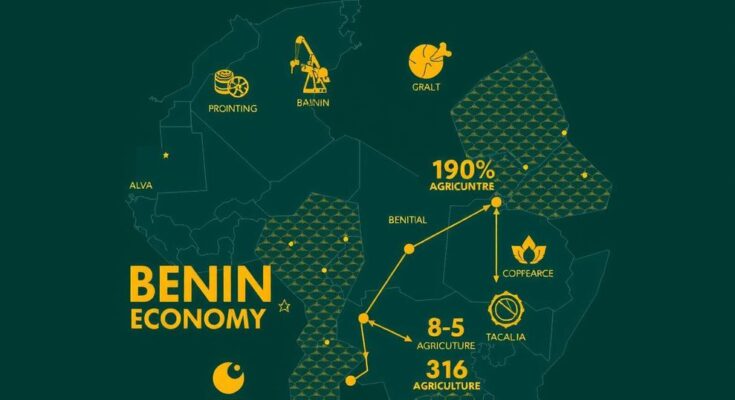Benin’s economy relies heavily on foreign assistance and agriculture, with about 70% of its workforce engaged in farming. Despite progressive reforms since the 1970s, challenges persist in governance and infrastructure. An underutilized deepwater port and booming agricultural exports offer potential for economic growth, yet long-standing issues impede progress.
Benin’s economy has historically relied heavily on external assistance, particularly from France and international organizations, which has mitigated the effects of economic stagnation affecting a majority of its populace. Following a coup in 1972, the regime attempted to implement socialist economic principles and reduce dependency on France by nationalizing various sectors. However, by the early 1980s, despite some structural changes, persistent corruption hampered visible improvements.
Agriculture plays a crucial role in Benin’s economy, with roughly 70 percent of the workforce engaged in this sector. The nation has made strides in achieving self-sufficiency in staple foods and has seen a rise in cash crop production. Livestock farming and fishing also contribute significantly to the economy, with increasing exports of fish to neighboring countries.
The industrial sector has seen growth in manufacturing, including the establishment of processing plants for palm oil and cotton, and cement production. Hydroelectric power generation commenced through a joint effort between Benin and Togo, providing needed electricity. Following the privatization of state banks, foreign investment has increased, providing additional support to the economy.
Benin’s trade is primarily based on agricultural exports such as cotton and cocoa, while it faces challenges due to informal trade with Nigeria. Transportation infrastructure, though limited, includes essential road networks and a railroad linking critical cities, with an international airport facilitating global connectivity. The Cotonou port holds significant potential for trade expansion, serving as a conduit for neighboring countries.
Overall, while Benin’s economic landscape exhibits potential for growth, it is hampered by historical dependencies, persistent challenges in governance, and infrastructural limitations that need to be addressed for sustainable development.
The economy of Benin is characterized by a heavy reliance on external aid and investment, primarily from former colonial power France and international entities, which has greatly influenced its development trajectory. Over the decades, Benin has experienced various political regimes that have alternated between socialist and liberal economic policies, each affecting the resource allocation and economic stability of the country. The agrarian nature of its economy, coupled with significant natural resources, sets the stage for potential economic diversification and growth.
In summary, Benin’s economy is deeply intertwined with its historical dependencies on external support and agricultural productivity. While there have been attempts to diversify and liberalize the economy, ongoing challenges such as corruption and inadequate infrastructure necessitate continued reforms. The potential for increased trade and industrial growth, particularly through the utilization of natural resources and strategic ports, remains a critical area for development.
Original Source: www.britannica.com




